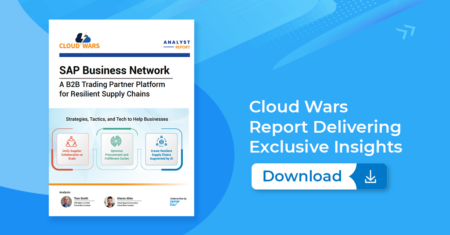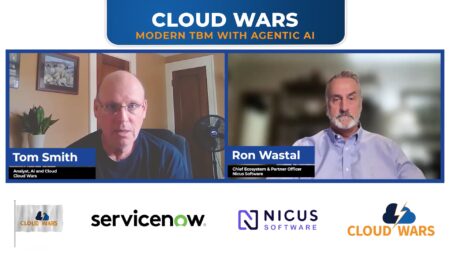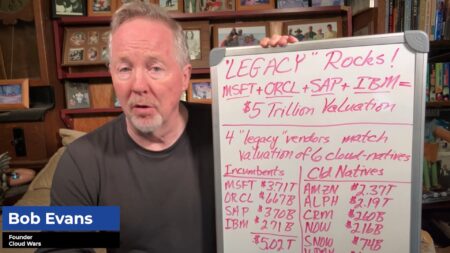After an extraordinary first year as CEO of ServiceNow, Bill McDermott says his company is uniquely positioned in 2021 to help business customers reimagine their business models and move faster than they ever have before.
ServiceNow is currently #9 on my weekly Cloud Wars Top 10 rankings, and McDermott and I spoke by Zoom in November 2020 as part of my new CEO Cloud Outlook Series. You can listen to the audio version of the interview here.
Business-model innovation
“As I think about our platform and the role it plays in this economy, the option of having ServiceNow really drives incredible business-model innovation,” McDermott said.
“Because if you look at companies like Disney reinventing themselves with Disney+, if you think about employee experiences where the employee now is in many cases being hired into a company and never actually physically meeting the people that hire them—but they need to have their tools and all the things to do their job and have self-service at their fingertips so they can be productive—all the way through to people building new applications on a platform because things are changing so quickly.
“All of this and more has just really put digital transformation at the center of every CEO’s agenda,” McDermott said.
5 years = 5 months
“What used to take five years is going to be done in five months.”
In the past year, ServiceNow has undergone its own extensive transformation as McDermott has repositioned the company that can sit at the center of those complex challenges and simplify them, integrate them, and accelerate them.
In so doing, he’s helped move ServiceNow from being a fast-growing company with highly regarded technologies aimed at technical audiences to a high-growth business alchemist that can do things for customers that no other cloud vendor can match.
And in McDermott’s unique way, he’s able to describe that in terms that put the high-value customer outcomes well out in front of the advanced technology that ServiceNow delivers. More and more in our hyperevolving world, those primary customer outcomes involve not only new business models but also accelerated decision-making and innovations that allow companies to move at the speed of their customers.
The need for speed
For McDermott and company, that means continuing to crank up the speed of its own internal operations even as it’s helping customers do the same—and to do so even as the COVID pandemic was beginning to wreak havoc with the global economy.
Every company confronts some defining moments: points at which vital decisions are made, postponed, or not made at all; points at which leaders choose to have their reach exceed their grasp, or choose to keep their heads down and hope the storm passes by; points at which companies choose, consciously or unconsciously, to be leaders or followers.
For McDermott and ServiceNow, that catalytic moment came 10 months ago and its cumulative impact is what has catapulted ServiceNow and its annual revenue run rate of about $4 billion to a market cap of more than $100 billion.
Defining moment
“I think what happened, Bob, when I walked into the boardroom to meet with our management team in March and looked around the table, we were there to do some blue-sky thinking on what we were going to do in the future to make ourselves one of the really significant companies in the world,” McDermott said.
“And I looked around the room and just said, ‘Look, if we don’t take an active role in helping the world overcome COVID, there’s not going to be very blue skies. So let’s dedicate ourselves to COVID.’
“And then we came out with the emergency-response applications, which then turned into this whole suite of return-to-work-safely applications, but it also illuminated the power of the Now Platform, because you could take something like that and invent it in a few days and roll it out globally,” McDermott said.
Again, the power of speed: “Our engineers spend their time inventing the future, not integrating the past, and that is tremendously inspiring to our teammates. Then that connects into the go-to-market machine, which connects into the customers and where they need to go, not where they are. And we can do it all in days and weeks, not years and months!”
McDermott then offered some vivid imagery that sharply contrasts what digital-native ServiceNow can offer to customers here at the dawn of 2021 versus what he feels the big established enterprise-applications and database companies can offer. And don’t forget—from 2010 through late 2019, McDermott was CEO of the archetypal “traditional” enterprise software company, SAP, during its decade of enormous growth.
But now, SAP and Oracle and Salesforce are, to use McDermott’s metaphor, cement contractors.
Systems of record vs. systems of action
“What I also have said time and again is many of the large-scale system of record investments that were laying down the cement for these enterprises in the 20th century, they’ll still play a role in the 21st century but that will be as systems of record. They have data and they record things—and whether that’s financial things or sales things or procurement things or HR things, it’s things.”
By contrast, McDermott says, ServiceNow will continue to outpace the field in 2021 because it focuses more on actions and outcomes rather than things (including cement!).
“But what we do is we’re a system of action. So we’re able to take an idea and manifest that idea into a system of action that enables people to work cross-functionally in teams to actually achieve a goal, achieve a mission. You just think about like a Veteran Affairs situation, where Veteran Affairs was a well-known difficulty because everybody wants to do the right thing for our heroic veterans, but the workflow and simplifying their lives and giving them access to the services was soul-crushing and complicated. Now on ServiceNow, it isn’t, and the veterans are happy and they’re getting services that they never were able to get before,” he said in referring to one of ServiceNow’s largest and highest-profile customers
“We put Uber up and running on a return-to-work-safely application suite in less than two weeks, while the market alternative couldn’t put together a demo in less than two weeks as they try to put together multiple disparate systems and marketplace partnerships to come up with a product,” McDermott said in warming to the subject of speed.
New model for decision-makers
“It’s not that they don’t see the need, it’s just that the need for speed has become so accelerated that tolerating system-of-record and complex integrations is just no longer an interesting outcome for decision-makers. They’ve got to get the job done now!”
The concept around the need for speed is certainly not a new one, but ServiceNow is clearly putting it at the center of its competitive positioning for 2021, which will surely be a year when the world continues to spin more rapidly than ever before.
Two examples:
“I’ll talk to a customer that might be in the retail space, and they say, ‘I need you because I don’t have retail open—I can’t even sell from my wholesalers—so I want to go direct to my consumer and give them an unbelievable service, but I need it now.’
“The same’s true on the employee experience. A very large financial services company hired 5,000 people so far this year in one department, and they didn’t meet any one of those 5,000 people. How do you get them a phone? How do you get them a computer? How do you give them their learning curriculum so they come in smart and knowing how to do the job? How do you give them access to their colleagues? How do they have access to all their benefits, their compensation? How, if they have a case, can they manage it by themselves without calling in, or God forbid, meeting somebody, because that’s not even possible?”
Therein, McDermott says, lies the primary difference between what ServiceNow and other software vendors can deliver.
“So the system of record didn’t go away—there’s still an HR system of record—but we make them look good. And there’s no competitive threats from us. And the same is true if they have a CRM system and they just need a system of action to rethink the service to a customer—they shouldn’t shy away from that. They should lean into that. And we’re happy to partner with all of them.”
Consumers call the shots—so be prepared
It’s certainly true that all of us as consumers have become conditioned to calling the shots, rather than being told by some faceless company what we can or can’t do, or how we will be allowed to do business with that company. For businesses that can’t live up to that standard, 2021 is going to be a brutal year as the approaches and policies and practices of the past are crushed by what McDermott calls the “service revolution.”
“Just think about a digital service where they didn’t have to call in, in the first place, because the user experience was so simple that anybody could do it. Then in the event that they were struggling, the workflow machine would understand that a workflow order has to be issued to either a bot who can come in and solve the problem or a human. But because of AI built-in to the workflow of ServiceNow, we can get the right person with the right skillset, the right level of empowerment, to solve the customer’s problem and do it on the fly and make everything simple,” McDermott said.
Customers fire suppliers
“That is very different than the case that I was brought to when the customer said, ‘I got them waiting for an hour for service.’ They’re on hold, and when an operator finally does get to them, they’re furious. And then because they’re furious, they’re not interested in the 20th-century SFA technique of, ‘Did you know you don’t have this product or that service yet?’
“Companies try that approach today and that angry customer’s going to say, ‘Actually, I’m glad you asked, because as soon as I can cancel all the services I have with you, I’ll switch to your competition.’ That’s the world that we’re in out there with 20th-century technology, and it’s time to change.”
Another fast-changing dynamic in the enterprise-software industry is the rush to vertical-market solutions—and McDermott says ServiceNow is all in.
“We have a full commitment to customer-service management, and that really matters only in an industry context. If you solve a tricky customer-service management issue for one financial-services firm, you can do it for all of them,” McDermott said in describing the leverage of industry expertise.
“It’s very similar to what could happen for telecommunications companies, or let’s think about entertainment companies, or pharma companies. It really does revolve around a platform approach in each of the industries that is custom tailored to each of the personas in an enterprise, and we’re doing that in every market around the world.”
As McDermott has infused that industry expertise into ServiceNow over the past 16 months, there’s been a parallel approach in having deeper and more-strategic understandings of the challenges faced by various members of the C-suite.
“So we built on the foundation of a great product company, and now we have conformed those products into solutions that are industry-specific—but we’ve also elevated the conversation with the C-suite personae in such a way that we can talk very specifically about their role in the enterprise, the heuristics around what we’ve achieved for other enterprises of a similar size and scale and industry dimension.”
All of those are initiatives that McDermott launched when he took over as CEO late in 2019, and all are in service to the ultimate objective McDermott will no doubt continue to focus upon throughout 2021 and beyond.
Experiences trump all
“Finally, I think in the end, it’s all about experiences, and you’ve got to give people great experiences, whether they’re your employees or they’re your customers. Whatever you do has to have that gorgeous collaborative user experience in mind, and that has to be the passion that literally possesses everything that is tied into your innovation machine: you’ve got to build everything from the ultimate consumer in,” McDermott said.
“The consumers rule the world, they pay the bills, and those are the ones that you’ve got to serve. If you’re a large enterprise company, you have to think beyond just your customer; you have to think about your customer’s customer, and it’s not good enough to just know. You have to truly understand what they want, where they’re going, and how you’re going to provide the absolute best service.”
Final Thought
After the year ServiceNow has had, and after watching McDermott nail every one of the objectives he laid out when he first joined ServiceNow and began remaking its strategy, positioning, and aspirations, it’s intriguing to think what he and his company can achieve in 2021. Here’s a glimpse at how he views the old world and the new world in which he views ServiceNow at the center.
“I think everything has to be done in the cloud—there’s really no reason not to move companies to the cloud,” McDermott said.
“If you think about the cloud economics, the speed of innovation, the importance of continuous innovation and doing so with the best economics in mind, the cloud just continues to accelerate at an incredible pace.
“And I think that platforms will be clearly established, and there will be defining platforms that companies adopt as a standard, and that the ecosystem accelerates as a standard.
“And those are the companies that are in the action business, not in the time-consuming, drawn-out, elongated-project business.”
RECOMMENDED READING
Check out our Cloud Wars Top 10 Special Report: Which Cloud Vendors Will Thrive in 2021? featuring comprehensive overviews of #1 Microsoft, #2 Amazon, #3 Salesforce, #4 Google Cloud, #5 SAP, #6 Oracle, #7 IBM, #8 Workday, #9 ServiceNow, and #10 Adobe. Here are the headlines and links to each of our 10 in-depth analyses:
Can Amazon, Google or Oracle Replace Microsoft as World’s #1 Cloud Vendor?
As Amazon Web Services Blows Past $50 Billion, Will Jeff Bezos Trigger Huge IPO?
With or Without Slack, Salesforce Will Remain #1 in Cloud Applications
Google Already Fastest-Growing Cloud Vendor, but Thomas Kurian’s Just Getting Started
SAP’S Huge Bet on Industry Cloud Could Be Game-Changer Against Oracle, Salesforce
Confounding His Critics, Larry Ellison Turns Oracle into Cloud Powerhouse
IBM’s Secret Weapon Isn’t Red Hat—It’s Much Bigger than That!
Workday Doubles Down on Planning, Analytics and ML to Rip and Replace Legacy IT
Bill McDermott and ServiceNow Are Disrupting the Software Industry—Hallelujah!
Can Shantanu Narayen and Adobe Replicate Consumer Magic in Enterprise?
Subscribe to the Cloud Wars Newsletter for in-depth analysis of the major cloud vendors from the perspective of business customers. It’s free, it’s exclusive and it’s great!








